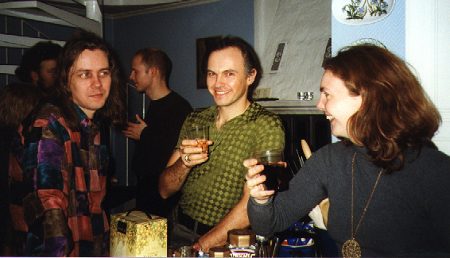
I have been doing this Thing for Twenty Years: I made my first conference presentation exactly twenty years ago, on November 27, 1998, at the Digital Arts & Culture Conference in Bergen.
My very first paper was A Clash Between Game & Narrative, based on the MA thesis I was finishing at the time.
It is painful to read your own early writings for two opposing reasons:
1) When it’s bad, I cringe that I would ever write like that.
2) If I find it good, I am embarrassed that I haven’t become any wiser.
I can’t say that anything panned out the way I planned in 1998, given that I had no actual plans for something as grown-up as an academic career, let along for academic research fields. But I felt I had a fallback in web/game development/programming, and that gave me the confidence to write academic papers about video games, even though there obviously was no future in this.

One thing that has changed, is that in my early papers I was openly taking on the role of (arrogant) young upstart, railing against the establishment. This was great fun, but I became better at understanding that though other people might be making arguments that I disagreed with, they weren’t necessarily stupid, or deserving of complete dismissal. When young researchers now criticize established academics such as myself, I in turn have to be careful not to dismiss them as simply performing the role of young academic.
But doing research turned out to be surprisingly interesting, and meeting like-minded young researchers was exhilarating, and eventually I was offered a PhD at ITU in Copenhagen.
When I thus first started seeing myself as someone who researched video games, I assumed that an academic career involved starting from a specific framework, making very strong claims, and then spending the rest of your career working with the same tools, sometimes backpedaling, but basically sticking to the same script for whatever decades a career is meant to span.
I saw myself, sitting in the same room but with different consoles, my beard growing longer and my hair growing shorter, expanding on some original point I had made.
Perhaps that is what it would have been like, if video games had continued to be somewhat singular products, always sold in boxes, as they were in the 1990’s?
It’s been my good luck that video games have changed and continue to change in entirely new ways during those twenty years. Tech changed, sure, but there are new interfaces, business models, new ways to play, new voices making video games. For that reason, I seem to (I think) always find new things to write about, but from quite different vantage points and using different theories. Video games change, and the study of video games must be attentive – to realize when video game history has overlooked some parts of the world, or some types of players or developers, and to take it seriously when new games appear, especially when they don’t match our expectations.
To do game studies, I think, is to watch the wheel of history grinding against our theoretical castles. And that’s enough.

Thank you for paving the way for some of us. I love analytically understanding video games. It is always a pleasure to know a researcher is out there doing just that =)